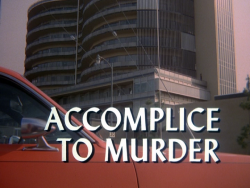Accomplice to Murder (Quincy, M.E.)
| Accomplice to Murder | ||||||||||||||||||||||||||||||||||||||
|---|---|---|---|---|---|---|---|---|---|---|---|---|---|---|---|---|---|---|---|---|---|---|---|---|---|---|---|---|---|---|---|---|---|---|---|---|---|---|

| ||||||||||||||||||||||||||||||||||||||
|
Episode Quote
"All I know is, a woman is dead and someone’s trying to make sure we never find out why. That’s not going to happen while I’m still asking questions." — Dr. Quincy, in Accomplice to Murder
Episode Overview
Accomplice to Murder is the 16th episode of Season 3 of Quincy, M.E. It originally aired on February 3, 1978, on NBC. In this episode, Dr. Quincy investigates the suspicious death of Karen Latham, a woman found dead in her apartment in what initially appears to be a burglary. Quincy's instincts and forensic expertise quickly reveal a far more sinister situation involving prolonged domestic abuse, police negligence, and a justice system failing victims of intimate partner violence.
Table of Contents
Application of The QME Episode Laws
Accomplice to Murder reflects all four foundational principles of the **QME Episode Laws**, as shaped by Jack Klugman's creative ethos:
✅ Law 1: Seek to uncover the truth and bring justice to the victim. Quincy challenges the police’s assumption that the case is a random robbery, using forensic detail to reveal that the victim suffered long-term abuse. He pursues justice for Karen Latham when others are content to ignore the signs.
✅ Law 2: Explore social and ethical issues, especially the struggle for justice against powerful systems. The episode addresses the systemic failure to protect women from domestic violence, highlighting the institutional apathy of law enforcement and the courts when the abuser has political connections.
✅ Law 3: Never shy away from complex or controversial topics. By tackling the emotionally fraught subject of intimate partner violence and exposing societal indifference, the episode sensitively presents difficult truths that were rarely seen on 1970s television.
✅ Law 4: Strive for scientific accuracy in medical and forensic investigations. Quincy’s examination of old fractures, internal bruising, and blood patterns demonstrates the medical rigor that the series was known for. He uses x-rays and wound analysis to dispute the original police theory.
Episode Synopsis
Karen Latham is found dead in her ransacked apartment. The police quickly label it a burglary gone wrong. But Dr. Quincy is unconvinced. During the autopsy, he discovers extensive signs of previous injuries, suggesting a long history of physical abuse.
Quincy investigates further, uncovering that Karen had repeatedly tried to report her abuser—her politically connected boyfriend—but was ignored by authorities. Her pleas for help were buried under bureaucracy and favoritism. Despite pressure to let the case drop, Quincy confronts law enforcement and local politicians who failed to act.
The trail eventually leads to Nora Taylor, Karen’s close friend, who reveals chilling details about the abuse and the political cover-up. In a dramatic conclusion, Quincy exposes not only the murderer, but also the social systems that allowed it to happen.
Main Cast
- Jack Klugman as Dr. R. Quincy
- Robert Ito as Sam Fujiyama
- Garry Walberg as Lt. Frank Monahan
- John S. Ragin as Dr. Robert Asten
Guest Cast
- Belinda J. Montgomery as Nora Taylor
- Ford Rainey as Judge Russell
- James A. Watson Jr. as Sgt. Lou Miller
- Joe E. Tata as Det. Grayson
- Robert Colbert as Philip Vaughn (Karen’s boyfriend)
Case File Summary
Victim: Karen Latham Cause of Death: Blunt-force trauma to the head Findings: Multiple healed fractures, bruising, staged robbery scene Case Type: Homicide with history of domestic abuse Suspect: Philip Vaughn, politically connected businessman Outcome: Arrested after forensic inconsistencies exposed and testimony from Nora Taylor
Filming Locations and Exterior Footage
This episode used a mix of stage interiors and real exteriors throughout Los Angeles. Notable sites include:
- Los Angeles County Coroner's Office
- LAPD Headquarters
- Generic apartment exteriors in West LA neighborhoods
Forensic Science Insight
- X-rays revealed multiple old fractures consistent with prolonged abuse.
- Bruising patterns and lack of defensive wounds indicated the victim was incapacitated before the final blow.
- Quincy analyzed staged elements of the burglary, noting that valuables were untouched and entry was likely faked.
- Toxicology reports ruled out sedation or substance use, pointing toward physical force as the cause of subduing.
Themes & Tropes
- Justice Against the Odds – Quincy refuses to let bureaucracy bury the truth.
- Social Injustice – The story calls out the failures of the legal system to protect vulnerable women.
- Forensic Truth vs. Political Spin – Quincy’s science-based evidence collides with politically motivated cover-ups.
- Institutional Apathy – Characters in authority prefer convenience over truth.
Reception & Ratings
Accomplice to Murder was praised for tackling a serious and often-overlooked issue with dignity. Critics and fans commended its unflinching portrayal of abuse and its realistic forensic detail.
- IMDb Rating: 7.3/10 ([IMDb](https://www.imdb.com/title/tt0681795/))
- TV Guide described it as "one of the season’s most sobering hours of television."
- Viewers responded positively to Belinda J. Montgomery’s heartfelt performance.
Trivia
- This is one of the earliest network TV dramas to use forensic evidence to highlight domestic violence.
- Belinda J. Montgomery would later star in another medical drama, Doogie Howser, M.D.
- The episode sparked viewer mail that helped inspire later socially driven plots in the series.
Cultural Impact
Accomplice to Murder helped establish Quincy, M.E. as more than a procedural — it became a platform for social commentary. This episode in particular raised awareness about domestic abuse, and its influence can be traced to later socially conscious crime shows.
See Also
- Quincy, M.E.
- List of Quincy, M.E. episodes
- Domestic violence
- Forensic pathology
- NBC
- 1978 in television
